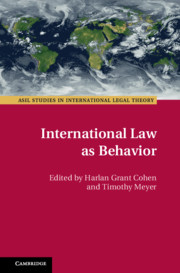Book contents
- International Law As Behavior
- ASIL Studies in International Legal Theory
- International Law As Behavior
- Copyright page
- Dedication
- Contents
- Tables
- Contributors
- Acknowledgments
- 1 International Law As Behavior
- 2 Deadlines As Behavior in Diplomacy and International Law
- 3 Cooperating without Sanctions
- 4 Egocentric Bias in Perceptions of Customary International Law
- 5 Explaining the Practical Purchase of Soft Law
- 6 Toward an Anthropology of International Law
- 7 Transnational Collaborations in Transitional Justice
- 8 Advancing Neuroscience in International Law
- 9 The Missing Persons of International Law Scholarship
- 10 The Wrong Way to Weigh Rights
- Index
2 - Deadlines As Behavior in Diplomacy and International Law
Published online by Cambridge University Press: 15 March 2021
- International Law As Behavior
- ASIL Studies in International Legal Theory
- International Law As Behavior
- Copyright page
- Dedication
- Contents
- Tables
- Contributors
- Acknowledgments
- 1 International Law As Behavior
- 2 Deadlines As Behavior in Diplomacy and International Law
- 3 Cooperating without Sanctions
- 4 Egocentric Bias in Perceptions of Customary International Law
- 5 Explaining the Practical Purchase of Soft Law
- 6 Toward an Anthropology of International Law
- 7 Transnational Collaborations in Transitional Justice
- 8 Advancing Neuroscience in International Law
- 9 The Missing Persons of International Law Scholarship
- 10 The Wrong Way to Weigh Rights
- Index
Summary
Like most other types of human activity, international legal practice relies heavily on deadlines. Yet deadlines have received little attention in international legal scholarship. This is the case even though deadlines are heavily studied in other contexts, with research finding that people frequently set and respond to deadlines in ways consistent with bounded rather than perfect rationality. This chapter takes up the topic of deadlines in international legal practice and makes four contributions. First, using the Chemical Weapons Convention as a case study, it explores ways in which deadlines are used in international legal practice and highlights just how pervasive they can be. Second, it reviews some behavioral research on deadlines in other contexts and demonstrates that these findings have intriguing parallels with how the Convention’s deadlines have functioned in practice. Third, it assesses the evidence available for evaluating the relevance of domestic research to international affairs in relation to deadlines. The chapter argues that, even though this evidence is currently limited, legal actors would do well to factor this research into their decision-making about how to structure and respond to deadlines. Finally, the chapter considers the extent to which these issues are common to both diplomacy and international law.
- Type
- Chapter
- Information
- International Law as Behavior , pp. 19 - 44Publisher: Cambridge University PressPrint publication year: 2021

